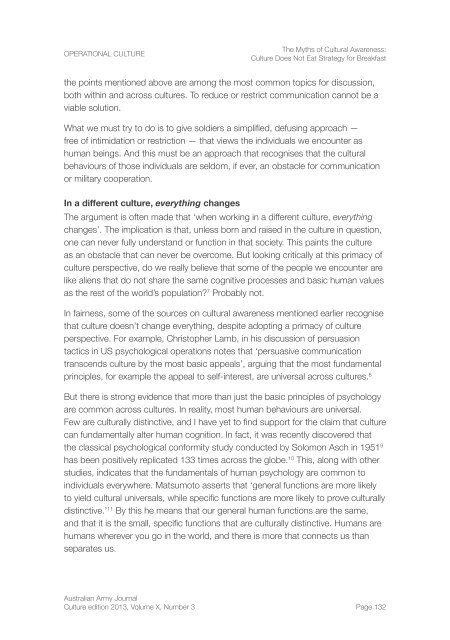Australian Army Journal
Australian Army Journal
Australian Army Journal
You also want an ePaper? Increase the reach of your titles
YUMPU automatically turns print PDFs into web optimized ePapers that Google loves.
OPERATIONAL CULTURE<br />
The Myths of Cultural Awareness:<br />
Culture Does Not Eat Strategy for Breakfast<br />
the points mentioned above are among the most common topics for discussion,<br />
both within and across cultures. To reduce or restrict communication cannot be a<br />
viable solution.<br />
What we must try to do is to give soldiers a simplified, defusing approach —<br />
free of intimidation or restriction — that views the individuals we encounter as<br />
human beings. And this must be an approach that recognises that the cultural<br />
behaviours of those individuals are seldom, if ever, an obstacle for communication<br />
or military cooperation.<br />
In a different culture, everything changes<br />
The argument is often made that ‘when working in a different culture, everything<br />
changes’. The implication is that, unless born and raised in the culture in question,<br />
one can never fully understand or function in that society. This paints the culture<br />
as an obstacle that can never be overcome. But looking critically at this primacy of<br />
culture perspective, do we really believe that some of the people we encounter are<br />
like aliens that do not share the same cognitive processes and basic human values<br />
as the rest of the world’s population? 7 Probably not.<br />
In fairness, some of the sources on cultural awareness mentioned earlier recognise<br />
that culture doesn’t change everything, despite adopting a primacy of culture<br />
perspective. For example, Christopher Lamb, in his discussion of persuasion<br />
tactics in US psychological operations notes that ‘persuasive communication<br />
transcends culture by the most basic appeals’, arguing that the most fundamental<br />
principles, for example the appeal to self-interest, are universal across cultures. 8<br />
But there is strong evidence that more than just the basic principles of psychology<br />
are common across cultures. In reality, most human behaviours are universal.<br />
Few are culturally distinctive, and I have yet to find support for the claim that culture<br />
can fundamentally alter human cognition. In fact, it was recently discovered that<br />
the classical psychological conformity study conducted by Solomon Asch in 1951 9<br />
has been positively replicated 133 times across the globe. 10 This, along with other<br />
studies, indicates that the fundamentals of human psychology are common to<br />
individuals everywhere. Matsumoto asserts that ‘general functions are more likely<br />
to yield cultural universals, while specific functions are more likely to prove culturally<br />
distinctive.’ 11 By this he means that our general human functions are the same,<br />
and that it is the small, specific functions that are culturally distinctive. Humans are<br />
humans wherever you go in the world, and there is more that connects us than<br />
separates us.<br />
<strong>Australian</strong> <strong>Army</strong> <strong>Journal</strong><br />
Culture edition 2013, Volume X, Number 3 Page 132

















